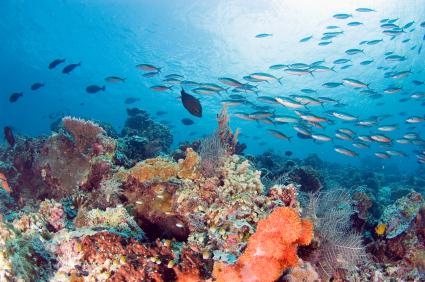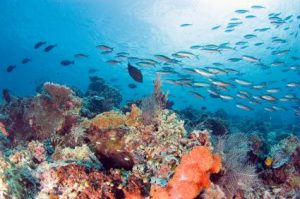
Two university research departments identify the causes of the destruction of coral reefs, and the effects of water pollution on ocean animal and plant life. The U.S. National Ocean Service provides information about the sources of most of the point source ocean pollutants.
The U.S. Environmental Protection Agency (EPA) on-line defines point source pollution as “any single identifiable source of pollution from which pollutants are discharged, such as a pipe, ditch, ship or factory smokestack.” Type “point source” into the EPA search box for more information.
“Coral reefs are iconic, threatened ecosystems that have been in existence for approximately 500 million years, yet their continued ecological persistence seems doubtful at present,” according to the National Coral Reef Institute, Nova Southeastern University, Dania, Florida. The quote comes from their article titled, “Coral Reefs: Threats and Conservation in an Era of Global Change,” dated April 11, 2009, and published on the PubMed web site. The authors of the article are Riegl B, Bruckner A, Coles SL, Renaud P, and Dodge RE.
Effects of Air Pollution on Coral Reefs & Ocean Life
The National Coral Reef Institute article blames “anthropogenic” (caused by humans) modification of the chemical and physical atmospheric forces (pollutants) that do not originate within the system itself. The result of these modifications, according to the article, is coral death from “…bleaching and new diseases due to increased oceanic heat and irradiation…” The article points to the decline of ocean calcification, and increasing acidification, due to increasing carbon dioxide (CO2) absorption from greenhouse gases.
“When properly managed, history shows that some protected ocean areas are experiencing coral reef regeneration and ocean animal and plant increase within the protected areas,” according the National Coral Reef Institute article. Despite the growing problems related to the effects of ocean polluting, the Institute believes that it is not too late to save threatened ecosystems.
Point Source Pollution and Sewage Treatment
The Faculty of Science, Health and Education points to their study of sewage discharges (point source) directly into the ocean, in Surin Marine Park, Thailand. The results of sewage discharges, according to the article, damaged the hard corals, caused declines in number of fish, caused ocean “chemical change” and “turbidity” (sediment stirred up or suspended). The study concludes, “…restoration of ecological reef health requires improved wastewater management.”


